#net migration rate
Explore tagged Tumblr posts
Text
“Demography is Destiny”…
… and Europe’s Destiny Dwindles. The quotation is borrowed from Auguste Comte (1798 – 1857), the reputed originator of the study of ‘sociology’, after having experienced the French Revolution. The polities of the defined continent of Europe (excluding Russia, which lies in two continents) contain 7.6% of the world’s population in 2023, as estimated by the World Factbook of the CIA. And the…
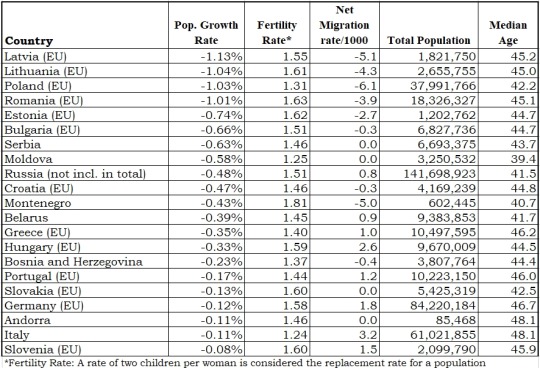
View On WordPress
0 notes
Text
#united kingdom#uk government#visa application restrictions#foreign nationals#asylum seekers#immigration and asylum#great britain#migration policy#high asylum claim rates#pakistan#nigeria#sri lanka#annual net migration#students#migrant workers
0 notes
Text

My fic based on the Eleonora's falcon's whumpy hunting strategies is here! Summary:
For generations, a certain population of Eleonora’s Falcons have been observed learning to capture smaller birds by shredding their wings and trapping them in rocky crevices to have fresh food available later. In the Avian tongue, Eleonora translates to Elytrian. In the Avian brain, Elytrian translates to nightmare. But while Avian Techno is dreading the moment he’s turned into lunch, Elytrian Philza hasn’t slept in three days trying to take care of his newborn. When the line between chick and chick food starts to blur, how will predator and prey handle it?
Design details below cut :) featuring lots of speculative biology and culture based on real birds.
General
Both species don't have feathers around their mouth for hygiene.
Evolutionary, they follow the
Their teeth are convergent evolution. They are not the same as mammal teeth.
We are ignoring the fact their flat faces are not the most aerodynamic.
Head wings are to increase mobility and the face aerodynamic problem. Somewhat similar to dragonflies where they have a lot more aerial precision, but doesn't allow them to hover.
Languages are grouped by Order. Some portions are instinctual, others are learned.
Avians
Avians are passarines. There are multiple species of Avian. Technoblade is based on colorful songbirds, but doesn't have a specific source.
Omnivores. Diet includes fruit, nuts, fish, insects, grains. Become more herbivores during migration because they can store long term.
Technoblade's feathers mimic the spears of a crown, with his back similar to cTechno's blue cape. His shoulders are very fluffy to mimic the fur of cTechno's hood, and because it's winter.
Evolved for long distance migration across the ocean. Their arms were primarily an adaptation for holding supplies during migration, but have found new purposes with the invention of society.
Because of their long head wings, Avians can't wear typical shirts. They also don't have a concept of chest modesty. The halter top is a way to carry more supplies while flying, and has a net interior. The sleeves are to keep their arms warm during migration. (and to mimic ctechno skin).
The long head wings make them incredibly agile in flight. Combined with their incredible endurance, if they can survive the initial attack they tend to do well.
Walk more upright than Elytrians since they don't have to counterbalance the same magnitude of wing.
Like to wear shiny stuff like gold.
Baggy drop pants to trap heat and because they don't tend to walk too much.
Can sleep with only one half of their brain while migrating so they're able to keep going.
Good mimicking abilities.
Elytrians
Elytrians are falconiformes.
Elytrians don't typically do the de-winging thing, it is a learned behavior within Philza's area (much like Eleonora's falcon). They find arms very useful for tearing while clutching the prey in their feet talons.
Nearly exclusively carnivorous.
Elytrians live further south of Techno's species, and migrate about a month after they've passed through.
Their general diet does not typically consist of Avians but instead other birds, or terrestrial prey like deer or smaller. They only eat Avians during migration/hatching season, targeting exhausted migrators.
The main hunting strategy is divebombing at incredible speeds. If they miss, they might pursue it little bit, but have a lower success rate.
As such, they have small head wings to avoid getting in the way of aerodynamics.
Small head wings also mean they can have more of a shirt! Tend to have sleeves, and don't cover up the chest because there's lots of fluffy feathers there, particularly in females. They don't have boobs. They're birds. That's. That's not how that works.
Females are larger.
Giant talons for ripping and shredding.
I uh did read articles about the Cretaceous–Paleogene mass extinction and stuff about gigantification and what not, but I think I'll stop myself before pontificating about the oxygen ratio in the atmosphere and potential gravity differences.......
#speculative biology#ouughhdghh#only thing my degree is useful for#dsmp#mcyt#sbi#sleepy bois inc#dark sbi#philza#technoblade#kristin#kristin minecraft#emerald duo#technoblade fanart#techno fanart#philza fanart#kristin fanart#mumza fanart#osmp#avian techno#elytrian#avian#wing au#sbi au#sbi fic#dark sbi fic#technoblade fic#techno fic#philza fic#wings
152 notes
·
View notes
Note
How much do you think rich people threatening to leave and basically holding their 'business' hostage actually affect taxes on the rich? I always see this coming up whenever it's even suggested that rich people pay taxes. Seems to make as much sense to me as the ol' 'the tourism the royal family brings in is totally worth their outrageous wealth hording' thing, an excuse to not do anything about it
When Scotland introduced a progressive tax rate, we had wall to wall press coverage about how this would result in a ‘brain drain’ and all the wealthy people would move just over the border and commute to Edinburgh simply because they could.
That didn’t happen. In fact, there’s been net migration into Scotland from elsewhere in the UK.
Funny how increasing taxes to spend on services makes the country a bit more liveable for everyone.
Austerity is genuinely a fool’s game. Labour are just continuing Tory austerity because they have a flawed view of the economy.
269 notes
·
View notes
Note
Fuck off commie, anyway people in droves have fled places like the Soviet Union, The Eastern Bloc,Cuba, North Korea and the POS PRC. So communism being successful is a farce. That being said I also hat communism because I don't want to be "equal" to those inferior to me.
I already knew you were a bigot, you made that clear in your last ask.
If you want to talk about "fleeing in droves", we can also talk about how the US and West Germany literally bribed people to cross over with the direct intent to cause economic instability and decline.
A persecuted American political dissident left the US to seek asylum in Cuba, Assata Shakur, and she's still living there today. She prefers it to the US. Donald Trump undid Obama's efforts to thaw relations with Cuba using their refusal to return her to the US for trial as one of his excuses.
When exactly were people fleeing the USSR or China outside of wartime or famine early on in their history? By the time the nations had stabilized and recovered, living conditions had vastly improved. The USSR from the 50s onward had a similar net migration rate to the United Kingdom or Denmark at the time, with a net positive NMR from the 70s all the way up to 1991 when emigration jumped massively due to the collapse of the USSR.
China has also had a very stable NMR outside of the period of famine, and most of the people who left during the famine returned to the country once the famine ended.
As for North Korea, you might want to watch this video:
youtube
If the DPRK is hell on earth, why would anyone who left be fighting for so many years to return to their home? Why would the ROK need to trick people into leaving and bribe them to spout lies about the country? Why would the ROK work to censor "defectors" who don't parrot the government's narrative regarding the DPRK? If the DPRK government is incompetent, why would the West need to sabotage them?
156 notes
·
View notes
Text
In 2023, the hottest year ever recorded, preliminary findings by an international team of researchers show the amount of carbon absorbed by land has temporarily collapsed. The final result was that forest, plants and soil – as a net category – absorbed almost no carbon.
There are warning signs at sea, too. Greenland’s glaciers and Arctic ice sheets are melting faster than expected, which is disrupting the Gulf Stream ocean current and slows the rate at which oceans absorb carbon. For the algae-eating zooplankton, melting sea ice is exposing them to more sunlight – a shift scientists say could keep them in the depths for longer, disrupting the vertical migration that stores carbon on the ocean floor.
37 notes
·
View notes
Text
After the U.S. election, pundits had predicted Dutton would follow Trump’s lead and beat Albanese, seen as a milquetoast one-term centrist, with tough talk and tax cuts. But the tariffs shock put Dutton, a former police officer, out of step with the national mood. He had praised Trump as “shrewd” and a “big thinker” after Trump had proposed to “level” Gaza, and intimated that he could have secured a better outcome with Washington than Albanese’s no-deal. That approach backfired, and the internet crowned him “Temu Trump”—meaning that he was nothing more than a cheaper knockoff of the American leader. By the time the federal election was eventually called on March 28, it was considered Albanese’s to lose.
Yet focusing on Trump’s role alone misses that foreign policy, unlike in Canada, was not even close to the most important political issue for Australian voters. Instead, surveys consistently ranked cost of living (“cozzie livs,” according to the Australian penchant for abbreviation) at no. 1. Also ranked highly were affordable housing and improving health services. Albanese riffed on this by brandishing his own government-issued Medicare card as he unveiled an $8.5 billion influx into the public health care system. No one could call Albanese’s campaign visionary: Along with the proposal to strengthen Medicare, he promised modest tax cuts, more money for child care, and cutting student loan debt, while remaining conspicuously quiet on climate change and foreign policy. Yet resisting the impulse to enter into a broader debate with Dutton on the national character and direction served him well.
In addition to warning about “woke” school curricula, the opposition advanced a central proposition of lower inflation, higher productivity, and lower taxes. The dog whistles were unnerving, though, and even as Coalition leaders stressed cheaper gas and tax cuts, voters didn’t trust them not to gut institutions such as Medicare. Meanwhile, the Liberals’ attempts to capitalize on antagonism toward migrants—net overseas migration has been the main driver of population growth over the last 30 years as fertility rates have fallen—fizzled. Unlike in the United States, immigration didn’t even rank in the top five voter concerns.
Dutton’s perceived zealotry may have even worked against him, worsening a decadelong phenomenon of voters in metropolitan areas drifting away from the Liberals. The result was a loss of seats in Sydney, Melbourne, Brisbane, and Adelaide to moderate “teals”: independents, usually women, who rallied around pillars of government accountability, anti-corruption, and combating climate change. In diverse outer metropolitan seats, voters also flocked to the center-left. With the primary vote slumping to record lows, Dutton lost his own seat.
The Australian Election Wasn’t Just About Trump
9 notes
·
View notes
Text
In 2023, the hottest year ever recorded, preliminary findings by an international team of researchers show the amount of carbon absorbed by land has temporarily collapsed. The final result was that forest, plants and soil – as a net category – absorbed almost no carbon. There are warning signs at sea, too. Greenland’s glaciers and Arctic ice sheets are melting faster than expected, which is disrupting the Gulf Stream ocean current and slows the rate at which oceans absorb carbon. For the algae-eating zooplankton, melting sea ice is exposing them to more sunlight – a shift scientists say could keep them in the depths for longer, disrupting the vertical migration that stores carbon on the ocean floor. “We’re seeing cracks in the resilience of the Earth’s systems. We’re seeing massive cracks on land – terrestrial ecosystems are losing their carbon store and carbon uptake capacity, but the oceans are also showing signs of instability,” Johan Rockström, director of the Potsdam Institute for Climate Impact Research, told an event at New York Climate Week in September. “Nature has so far balanced our abuse. This is coming to an end,” he said.
....
“None of these models have factored in losses like extreme factors which have been observed, such as the wildfires in Canada last year that amounted to six months of US fossil emissions. Two years before, we wrote a paper that found that Siberia also lost the same amount of carbon,” says Ciais. “Another process which is absent from the climate models is the basic fact that trees die from drought. This is observed and none of the models have drought-induced mortality in their representation of the land sink,” he says. “The fact that the models are lacking these factors probably makes them too optimistic.”
...
“We shouldn’t rely on natural forests to do the job. We really, really have to tackle the big issue: fossil fuel emissions across all sectors,” says Prof Pierre Friedlingstein of Exeter University, who oversees the annual Global Carbon Budget calculations. “We can’t just assume that we have forests and the forest will remove some CO2, because it’s not going to work in the long term.”
When I first heard about this I saw that scientists didn't know if this would be temporary or not, this article states it "could" be temporary so... well...
#anyone else feeling so stressed it loops back to not gaf#like i gaf but also if i actively worry I will go crazy#mental hospital crazy
18 notes
·
View notes
Note
"immigrants are taking our houses" seems equally common messaging in here in Canada than "immigrants are taking our jobs" perhaps more
"we're not building enough houses to keep up with our immigration rate" is a slightly politer and more helpful take but yeah.
let's see what the AI says on houses:
According to recent data, Australia builds around 170,000 new homes each year, though this number is considered significantly below the required amount to meet the current housing demand, with targets set closer to 240,000 new homes annually.
and what is says on immigration:
Australia's net overseas migration (NOM) for the year ending June 30, 2024 was 446,000 people, which was a decrease from the previous year's record of 536,000
and population growth as a whole:
According to the latest data, Australia's population grew by approximately 2.1% in 2024, with a net increase of around 552,000 people, reaching a total population of roughly 27.2 million as of June 30, 2024.
so 3.2 new people for each new home; I wonder what the breakdown is on how many of those new homes were one or two bedroom apartments.
11 notes
·
View notes
Text
Thanks to immigrants, Canada was likely one of the fastest growing countries in the world between July 2022 and July 2023, according to a new Statistics Canada report.
Canada's population surpassed 40 million on June 16 and grew to 40,097,761 by July 1, an increase of 1,158,705 people – or 2.9 per cent – from July 1, 2022. In a demographic report released on Tuesday, StatCan said this rate of growth places Canada ahead of all other G7 countries and among the top 20 fastest growing countries in the world during that period.
While the difference between births and deaths accounts for two per cent of this growth, the agency said 98 per cent came from net international migration. In fact, Canada's fertility rate reached a record low in 2022, with 1.33 children born per woman, compared with 1.44 in 2021. [...]
Continue Reading.
Tagging: @politicsofcanada, @vague-humanoid
68 notes
·
View notes
Text
Discovering the world
Lebanon 🇱🇧
Basic facts
Official name: الجمهورية اللبنانية (al-Jumhūrīyah al-Lubnānīyah) (Republic of Lebanon)
Capital city: Beirut
Population: 5.3 million (2023)
Demonym: Lebanese
Type of government: unitary parliamentary republic
Head of state: vacant (President)
Head of government: Najib Mikati (Prime Minister)
Gross domestic product (purchasing power parity): $78.23 billion (2022)
Gini coefficient of wealth inequality: 31.8% (medium) (2011)
Human Development Index: 0.723 (high) (2022)
Currency: pound (LBP)
Fun fact: It hosts the highest number of refugees per capita and per square kilometer.
Etymology
The country’s name comes from Mount Lebanon, whose name derives from the Phoenician root lbn, meaning “white”.
Geography
Lebanon is located in West Asia and borders Syria to the north and east, Israel to the south, and the Mediterranean Sea to the west.
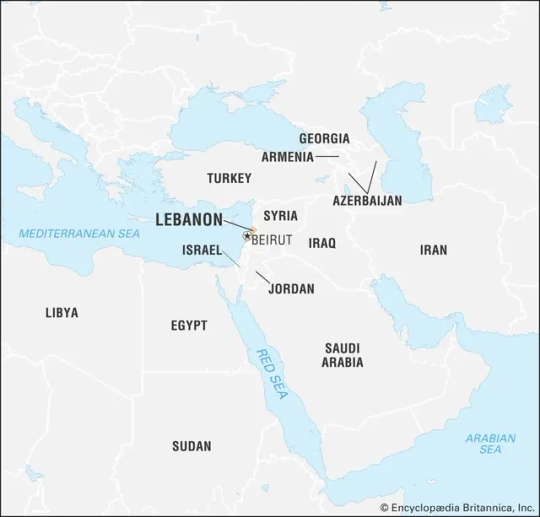
There are two main climates: Mediterranean-influenced humid continental in the center and east and hot-summer Mediterranean in the rest. Temperatures range from 11 °C (51.8 °F) in winter to 30 °C (86 °F) in summer. The average annual temperature is 20.9 °C (69.6 °F).

The country is divided into nine governorates (muḥāfaẓāt), which are further divided into twenty-five districts (aqdyah). The largest cities in Lebanon are Beirut, Tripoli, Jounieh, Zahlé, and Sidon.
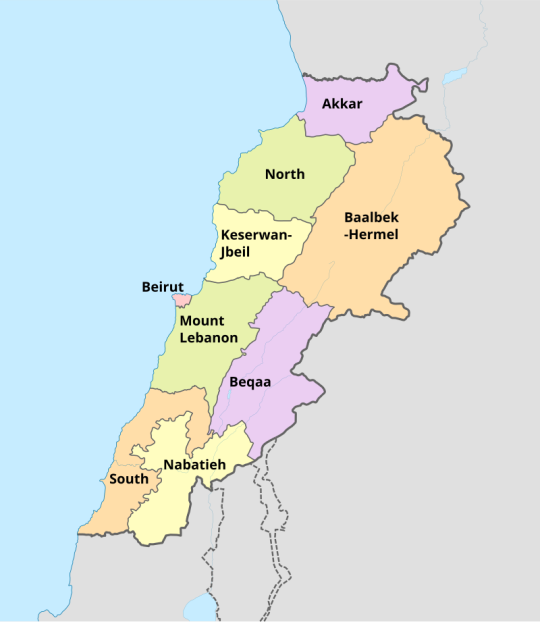
History
2500-64 BCE: Phoenicia
1650-1180 BCE: Hittite Empire
1550-1069 BCE: New Kingdom of Egypt
550-332 BCE: Achaemenid Empire
332-64 BCE: Seleucid Empire
64 BCE-394 CE: Roman Empire
394-635: Byzantine Empire
619-629 CE: Sasanian Empire
636-661: Rashidun Caliphate
661-750: Umayyad Caliphate
750-1517: Abbasid Caliphate
1099-1291: Kingdom of Jerusalem
1102-1289: County of Tripoli
1250-1516: Mamluk Sultanate
1516-1842: Emirate of Mount Lebanon
1516-1918: Ottoman Empire
1843-1861: Double Qaim-Maqamate of Mount Lebanon
1860: civil conflict in Mount Lebanon and Damascus
1915-1918: Great Famine of Mount Lebanon
1920-1926: State of Greater Lebanon
1923-1946: Mandate for Syria and the Lebanon
1926-1943: Lebanese Republic
1943-present: Republic of Lebanon
1948: Arab-Israeli War
1975-1990: Lebanese Civil War
1976-2005: Syrian occupation
1985-2000: South Lebanon conflict
2005: Cedar Revolution
2006: Lebanon War
2006-2008: protests
2007: Lebanon conflict
2011: Intifada of Dignity
2019: 17 October Revolution
2020: Beirut explosion
2021: Beirut clashes
Economy
Lebanon mainly imports from the European Union, Türkiye, and China and exports to the European Union, the United Arab Emirates, and Switzerland. Its top exports are diamonds, polyacetals, and gold.
It has natural gas, limestone, oil, and salt reserves. Services represent 83% of the GDP, followed by industry (13.1%) and agriculture (3.9%).
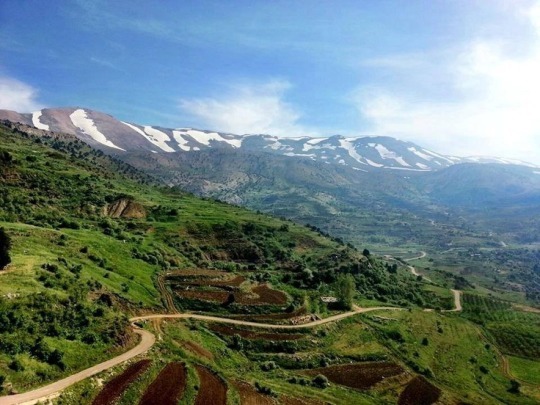
Lebanon is a member of the Arab League, la Francophonie, and the Organization of Islamic Cooperation.
Demographics
95% of the population is Arab, while Armenians make up 4%. The main religion is Islam, practiced by 55% of the population, 27.6% of which is Sunni.
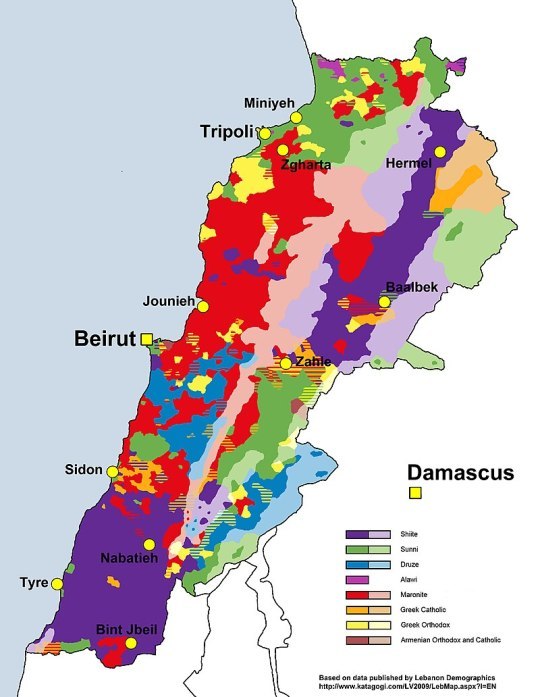
It has a negative net migration rate and a fertility rate of 1.7 children per woman. 89% of the population lives in urban areas. Life expectancy is 78.3 years and the median age is 31.3 years. The literacy rate is 96.7%.
Languages
The official language of the country is Arabic. French is spoken by 40% of the population.

Culture
Lebanese culture has Persian, Greek, Roman, Arab, Ottoman, and French influences. Lebanese people are very gregarious.
Men traditionally wear a shirt, a dark vest, baggy pants (sherwal), a belt, and a headdress. Women wear a shiny dress (gambaz), a wide belt, and a conical hat with a long piece of silk (tantur).

Architecture
Traditional houses in Lebanon are made of stone and wood and have flat roofs and terraces.

Cuisine
The Lebanese diet is based on fish, meat, pulses, and vegetables. Typical dishes include bamieh bi-zeit (okra and tomato stew), kibbeh (fried balls made of spiced meat and bulgur), sayadieh (seasoned fish and rice), sfouf (an almond-semolina cake), and tabbouleh (a salad of bulgur, onion, tomatoes, and parsley).
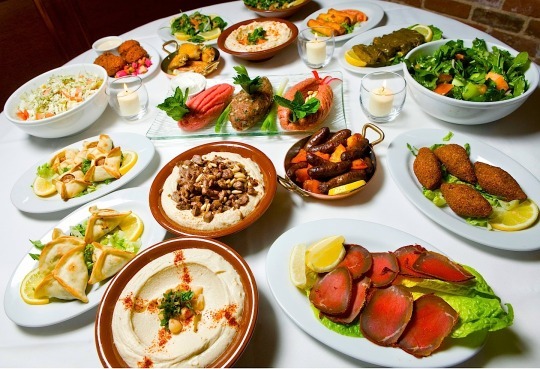
Holidays and festivals
Like other Christian and Muslim countries, Lebanon celebrates Epiphany, Armenian Christmas, St. Maroun Day, Feast of the Annunciation Day, Good Friday, Easter Sunday, Assumption, Christmas Day, Islamic New Year, Ashura, Mawlid, Eid al-Fitr, and Eid al-Adha. It also commemorates New Year’s Day and Labor Day.
Specific Lebanese holidays include Rafic Hariri Memorial Day on February 14, Liberation and Resistance Day on May 25, and Lebanese Independence Day on November 22.

Independence Day
Other celebrations include the Aerial and Circus Arts Festival, the Baalbeck International Festival, which features dance and music performances, and the Beiteddine Art Festival.

Baalbeck International Festival
Landmarks
There are six UNESCO World Heritage Sites: Anjar, Baalbek, Byblos, Ouadi Qadish (the Holy Valley) and the Forest of the Cedars of God (Horsh Arz el-Rab), Rachid Karami International Fair-Tripoli, and Tyre.

Ouadi Qadish and the Forest of the Cedars of God
Other landmarks include Jabal Moussa, the Mohammad Al-Amin Mosque, the Moussa Castle, Our Lady of Lebanon, and the Tripoli Citadel.
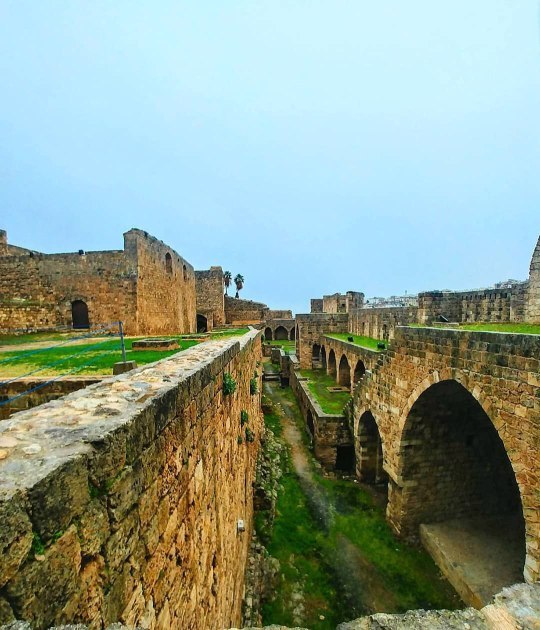
Tripoli Citadel
Famous people
Amin Maalouf - writer
Elie Saab - fashion designer
Fares Fares - actor
Jackie Chamoun - skier
Khalil Beschir - racing driver
May Ziade - poet and writer
Nadine Labaki - actress
Najwa Karam - singer
Ragheb Alama - singer
Rima Fakih - model

Rima Fakih
You can find out more about life in Lebanon in this post and this video.
7 notes
·
View notes
Text
In 2023, the hottest year ever recorded, preliminary findings by an international team of researchers show the amount of carbon absorbed by land has temporarily collapsed. The final result was that forest, plants and soil – as a net category – absorbed almost no carbon. There are warning signs at sea, too. Greenland’s glaciers and Arctic ice sheets are melting faster than expected, which is disrupting the Gulf Stream ocean current and slows the rate at which oceans absorb carbon. For the algae-eating zooplankton, melting sea ice is exposing them to more sunlight – a shift scientists say could keep them in the depths for longer, disrupting the vertical migration that stores carbon on the ocean floor.
The report found habitat degradation and loss was the biggest threat to wildlife, followed by overexploitation, invasive species, disease, climate change and pollution. Lead author and WWF chief scientific adviser Mike Barrett said through human action, "particularly the way that we produce and consume our food, we are increasingly losing natural habitat”. The report also warns nature loss and climate change are fast pushing the world towards irreversible tipping points, including the potential "collapse" of the Amazon rainforest, whereby it can no longer lock away planet-warming carbon and mitigate the impacts of climate change.
#climate change#we have to fundamentally alter how we live#and I just.... I don't see that happening#the best we can do is mitigate
3 notes
·
View notes
Text
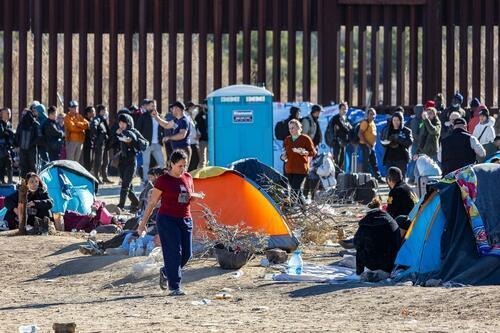
At least 59.4 percent of illegal immigrant-led homes use one or more welfare programs, compared with 39 percent of households headed by people born in the United States, according to the Dec. 19 report.
High rates of welfare use among illegal immigrants “primarily reflect their generally lower education levels and their resulting low-incomes, coupled with the large share who have U.S.-born children who are eligible for all welfare programs from birth,” the report reads.
“More than half of all illegal immigrant households have one or more U.S.-born children.”
Children born to illegal immigrants in the United States, also known as “anchor babies,‘ are considered to have automatic birthright citizenship even though the U.S. Supreme Court hasn’t explicitly ruled on the matter. Illegal immigrants can’t access most welfare programs, a restriction that eases for their children who are born in the country.
“The American welfare system is designed in large part to help low-income families with children, which describes a large share of immigrants,” CIS states in the report.
A dozen states offer Medicaid to all low-income children regardless of immigration status. Such children also have access to various government food and meal programs.
Programs such as Temporary Assistance for Needy Families, the Women, Infants, and Children nutrition program, free or subsidized lunch and breakfast for students, and Medicaid for children (Children’s Health Insurance Program) were “explicitly created for minors,” the report states.
The CIS report is based on data from the U.S. Census Bureau’s 2022 Survey of Income and Program Participation (SIPP).
“The reality is that illegal immigrants are included in the SIPP, a large share of them are poor, and they or their U.S.-born children have welfare eligibility; and many take advantage of this eligibility,” CIS stated.
“A very large share of immigrants come to America, have children, struggle to provide for them, and so turn to taxpayers for support. This can be seen as especially problematic given that there is already a large number of Americans who are also struggling to provide for their children.”
According to data from the Federation for American Immigration Reform (FAIR), the total number of U.S.-born children of illegal aliens in the United States as of June stood at 5.78 million, a population more than two times that of Chicago.
FAIR estimates that “illegal aliens and their U.S.-born children impose a net annual cost of $150.6 billion on American taxpayers as of the beginning of 2023.” Over the past five years, the annual cost has risen by almost $35 billion.
“This burden will only continue to grow as a result of the Biden administration’s open-borders policies,” the organization warns.
Ending Birthright Citizenship
Multiple GOP members have taken a strong stance against birthright citizenship. In 2018, former President Donald Trump said he would remove birthright citizenship via executive order, which didn’t happen.
In his 2024 campaign, President Trump has reiterated his position on the matter. In a May video, President Trump promised to sign an executive order on day one of his second term to solve the issue.
Such an order would end the “unfair practice known as birth tourism, where hundreds of thousands of people from all over the planet squat in hotels for their last few weeks of pregnancy to illegitimately and illegally obtain U.S. citizenship for the child, often to later exploit chain migration to jump the line and get green cards for themselves and their family members.”
“At least one parent will have to be a citizen or a legal resident in order to qualify,” President Trump stated.
Republican presidential candidate Vivek Ramaswamy called for an end to birthright citizenship for children of illegal immigrants during the second GOP debate, in September.
“Now, the left will howl about the Constitution and the 14th Amendment. The difference between me and them is I’ve actually read the 14th Amendment. And what it says is that all persons born or naturalized in the United States and subject to the laws and jurisdiction thereof are citizens,” Mr. Ramaswamy said.
“So nobody believes that the kid of a Mexican diplomat in this country enjoys birthright citizenship—not a judge or legal scholar in this country will disagree with me on that. Well, if the kid of a Mexican diplomat doesn’t enjoy birthright citizenship, then neither does the kid of an illegal migrant who broke the law to come here.”
In July, Rep. Matt Gaetz (R-Fla.) introduced a proposal called “End Birthright Citizenship Fraud Act of 2023,” which aims to abolish automatic birthright citizenship for U.S.-born children of illegal immigrants.
Under the legislation, at least one parent of the child must be a U.S. national or a refugee, have lawful permanent citizenship, or be an active member of the military.
“My legislation recognizes that American citizenship is a privilege—not an automatic right to be co-opted by illegal aliens,” Mr. Gaetz said in a statement.
“This is an important step in preserving the sanctity of American citizenship and ensures that citizenship is not treated as a loophole to be exploited but rather a privilege to be earned when legally migrating to our country.”
4 notes
·
View notes
Text
Tuesday, June 25, 2024
The ‘double haters’ (Washington Post) Ask voters here in far western Wisconsin what they think of their two main presidential choices in November—the same two choices they had four years ago—and the answers, even tinged with Midwest nice, come out hard and blunt. “Absolute trash.” “Three hundred-and-some-odd-million people and that’s all we can get?” “Terrifying.” “Both options suck. And it’s going to, I think, boil down to what sucks less.” With Election Day less than five months away, voters here in Hudson are increasingly preoccupied with just which option—President Biden, 81, or former president Donald Trump, 78—is “the evil we’ve got to vote for,” in the words of Gregory Wold, 57, a retired corrections department employee from North Hudson, Wis. These and other “double haters”—voters who are dissatisfied with both major party choices—are again pondering the same two options, and again are coming up largely disappointed. These double haters are likely to prove a critical voting bloc in November. They are a group that could help determine the outcome in a close election, especially in critical swing states like Wisconsin, and one that has become the focus of considerable attention and outreach from both campaigns.
Venezuelan migrants (NPR) Over the past two years, the city of Chicago has struggled to care for destitute migrants arriving from the southern border. The majority, around 30,000, are from Venezuela, a South American country whose economy has collapsed. But the number of Venezuelans in Chicago hardly compares to how many have migrated over the past decade to neighboring Colombia. Bogotá alone, the capital, has received more than 600,000. Colombia initially rolled out the welcome mat and, by many measures, absorbed this population with little harm and many benefits. Nearly 1.9 million Venezuelans gained paths to formal employment as well as Colombia’s education and health care systems. More recently, however, Colombia’s migrant integration has begun to falter due to the indifference of a new president, waning interest among international donors and a wave of xenophobia rippling through the public. Still, Colombia—a decade into a muddled but essentially humane response to a migrant crisis—holds many lessons for Chicago.
Sweden: Youth homes and gun violence (Reuters) The killer was only 14 and had lived in youth homes as a ward of the authorities since he was eight. A year ago, a gang helped the boy escape, put him up in a hotel and gave him cannabis, food and new clothes. Six days later, gang members told him it was time to repay them for their kindness. They had a job for him. Together with another youth, the boy, who as a juvenile cannot be identified, shot dead a 33-year-old Hells Angels biker. He was convicted by a court which described the case as a gangland contract killing. As he was too young to be sentenced, he was handed back to social services and sent to another youth home. Sweden has long prided itself on one of the world's most generous social safety nets, with a state that looks after vulnerable people at all stages of life. But these days it also has another distinction: by far the highest per capita rate of gun violence in the EU. Last year 55 people were shot dead in 363 separate shootings in a country of just 10 million people. By comparison, there were just six fatal shootings in the three other Nordic countries—Norway, Finland and Denmark—combined. In an increasing number of cases, courts have found the epidemic of violence emerging from Sweden's archipelago of youth homes, built to serve the dual purpose of looking after children in state care and punishing youth offenders.
Costly election pledges in France stoke fears of splurges that risk pushing country deeper into debt (AP) The promises are appealing—and expensive. Vying to oust the centrist government of President Emmanuel Macron in an upcoming two-round parliamentary election June 30 and July 7, French political parties of both the far right and far left are vowing to cut gasoline taxes, let workers retire earlier and raise wages. Their campaign pledges threaten to bust an already-swollen government budget, push up French interest rates and strain France’s relations with the European Union. “The snap election could well replace Macron’s limping centrist government with one led by parties whose campaigns have abandoned any pretense of fiscal discipline,” economist Brigitte Granville of Queen Mary University of London wrote Thursday on the Project Syndicate website.
Gunmen Attack Synagogues and Churches in Russian Republic (NYT) Gunmen attacked synagogues and churches in two cities in southern Russia on Sunday, killing multiple police officers and a priest, in an apparently coordinated assault that underscored Russia’s vulnerability to extremist violence. Officials said six of the gunmen were killed after shootouts in the two cities, Makhachkala and Derbent, in the predominantly Muslim region of Dagestan on the Caspian Sea. Wielding rifles and Molotov cocktails, they attacked a synagogue and a church in each of the two cities. The precise death toll was not immediately clear. Sergei Melikov, Dagestan’s governor, said that “more than 15 police officers fell victim to today’s terrorist attack,” without specifying how many of them were killed and how many were wounded. Dagestan, one of Russia's poorest provinces, is predominantly Muslim and has in the past been the scene of Islamist attacks.
Russia threatens ‘consequences’ for US over Crimea missile strikes (Politico) Moscow on Monday warned of "consequences" for America, as it accused Washington of being involved in deadly strikes on Russian-occupied Crimea using U.S.-made rockets. According to Russia's state-owned RIA Novosti, Kremlin spokesperson Dmitry Peskov said "time would tell" what the response would be to the use of what Moscow claims were five Army Tactical Missile System (ATACMS) missiles donated to Ukraine by the U.S. “Of course, the involvement of the United States of America in hostilities, direct involvement in hostilities that result in the death of Russian civilians, this, of course, cannot but have consequences," Peskov said. "What exactly—time will tell.” While Russia's defense ministry claims to have intercepted four of the missiles, fragments of a fifth detonated in mid-air after being struck by air defenses, killing four people and injuring 151 on the ground, according to the RIA Novosti report.
Nearly 2 million people stranded as second wave of devastating floods hits Bangladesh in less than a month (CNN) Bangladesh’s unusually wet rainy season has caused a second flooding disaster within a month, stranding over 1.8 million people in the country’s northeastern regions. After weeks of heavy rains fed rivers upstream near Bangladesh’s border with India until they grew past their danger marks, the floodwaters submerged homes and farmland across the region. Villagers have been forced to wade through waist-deep water to recover items from their homes, and some parts of the northeast will likely face food and clean water shortages, according to officials. The South Asian country is expected to be disproportionately impacted by climate change in the near future—the World Bank estimates that about 13 million Bangladeshi citizens could become climate migrants by 2050, causing a 9% dip in the country’s GDP.
The Philippines needs rice—but young people don’t want to farm it (Washington Post) In the Philippines, people say, “Bigas ay buhay”: “Rice is life.” It’s a neutral canvas for every meal. Other foods are often served as “ulam,” the topping or side dish for rice. Rather than unlimited soda, fast-food chains serve “unli-rice.” Rice missing from a meal is almost an accusation: You’re committing papak. Some 2.4 million Filipinos work as rice farmers, toiling on lush paddies that blanket the country, some on ancient terraces that cut through steep hills. But for young people, the grueling, volatile and often impoverished life of a rice farmer holds dwindling appeal. With fewer young people willing to farm, the average age of a Filipino rice farmer is 56—and climbing. The shift away from farming could mean food shortages in the Philippines, which already imports more rice than any other country.
‘Hamster’ crypto craze has taken Iran (AP) Cab drivers and bikers tap away furiously on their mobile phones as they wait at red lights in the Iranian capital during an early June heatwave. Some pedestrians in Tehran are doing the same. They all believe they could get rich. The object of their rapt attention? The “Hamster Kombat” app. A wider crypto craze aside, the app’s rise in Iran highlights a harsher truth facing the Islamic Republic ahead of Friday’s presidential election to replace late President Ebrahim Raisi, who died in a helicopter crash in May: an economy hobbled by Western sanctions, stubbornly high inflation and a lack of jobs. Even as presidential candidates make promises about restoring the country’s economy, Iranians, who have been hearing for years about bitcoin, are now piling into this app out of sheer hope it might one day pay off. “It’s a sign of being desperate, honestly,” said Amir Rashidi, the director of digital rights and security at the Miaan Group who is an expert on Iran. It’s about “trying to hang on to anything you have a tiny hope that might some day turn to something valuable.”
Netanyahu says Israel is winding down its Gaza operations. But he warns a Lebanon war could be next (AP) Israeli Prime Minister Benjamin Netanyahu said Sunday that the current phase of fighting against Hamas in Gaza is winding down, setting the stage for Israel to send more troops to its northern border to confront the Lebanese militant group Hezbollah. The comments threatened to further heighten the tensions between Israel and Hezbollah at a time when they appear to be moving closer to war. Netanyahu also signaled that there is no end in sight for the grinding war in Gaza. The Israeli leader said in a lengthy TV interview that while the army is close to completing its current ground offensive in the southern Gaza city of Rafah, that would not mean the war against Hamas is over. But he said fewer troops would be needed in Gaza, freeing up forces to battle Hezbollah.
Israeli Military Says Troops Tied a Wounded Palestinian to a Vehicle (NYT) Israeli troops tied a wounded Palestinian to the top of a military vehicle on Saturday morning during an operation in the occupied West Bank, a scene that was captured on video and quickly went viral, prompting outrage and the promise of an investigation by Israel’s military. Although the Israeli military said it would investigate, human rights groups have regularly criticized the country’s military-justice system, which they say rarely indicts or convicts those accused of inappropriate violence against Palestinians. The troops handed over the wounded man to the Palestinian Red Crescent for medical care, the Israeli military said. Mr. Ballas had been shot in the leg and arm, and his skin had burns from lying on the vehicle’s hood in the scorching sun, said his father, Raed Ballas. Mujahid Ballas was visiting his uncle’s house to play cards during his weekend holiday, his father said. He denied his son was involved in any militant activity, pointing to the fact that the Israeli security services had ultimately released him after the raid.
400-meter runner goes from locked in a porta-potty straight to the Olympics (AP) It was a classic case of going from the outhouse to the penthouse. Less than an hour before her semifinal at U.S. track trials, 400-meter runner Kendall Ellis was trapped in a porta-potty, banging on the door, screaming for someone to let her out. Thankfully, somebody did. She won that race in a personal-best time, then came back Sunday to top that mark and win the final, along with the national championship and the spot in the Olympics that comes with it. “Crazy things happen right before something great is about to occur, so maybe I needed that to get all the nerves and adrenaline out,” she said.
2 notes
·
View notes
Text
Al Jazeera English: ‘The only way for us to survive’: The life of a New York City candy seller
New York City, United States – A clock on the electronic display flickers to noon above the bustling Times Square subway station in New York City. Amid the lunchtime crowd of commuters and tourists stands María, a 31-year-old single mother from Ecuador whose daily life revolves around this transit hub.
It is here, in the tunnels underneath the city, that María earns the money she needs to survive.
On her back is her two-year-old daughter, and in her hands is a colourful tray of candy, crammed with packages of M&Ms and Kit Kat chocolates and sticks of Trident gum.
From the Times Square station, María can hop on and off the Number 7 train, a popular link to the borough of Queens. As she walks from one carriage to the next, she repeats “candy” and “dollar” — two of the few words she knows in English — hoping to make a sale.

New York City is in the midst of an immigration crisis, with more than 113,300 asylum seekers arriving since 2022 — and too few shelters to house them. With the city’s immigration policies in the spotlight, María’s interactions with the public can be tense.
“People insult us or record us without authorisation, accusing us of importing bad habits and poverty from home,” María said. “They don’t understand our situation.”
María — who is using a pseudonym to protect her privacy — is part of a population of largely Ecuadorian candy sellers who make a living on the New York City subway system.
Peddling sweets is familiar work for María: It is the same job she used to do in her hometown in the province of Cotopaxi. But it is also a necessity. Without legal papers authorising her stay in the US, finding steady employment is difficult, seemingly impossible.
“It’s what my cousin and other women from Ecuador I know do because there are no job opportunities. It’s the only way for us to survive,” María explained.
Sign up for Al Jazeera
Americas Coverage Newsletter
US politics, Canada’s multiculturalism, South America’s geopolitical rise—we bring you the stories that matter.
But each sale only nets her one dollar, maybe two. After working 13 hours straight, from 7am to 8pm, she might come home with $50 on a good day, $10 on a bad one.
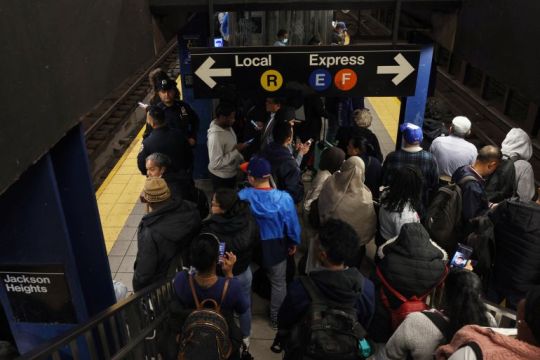
A ‘third wave’ of Ecuadorian migration
By the end of September, the US Border Patrol had apprehended 117,487 Ecuadorians for the fiscal year 2023 — more than four times the previous year’s total.
Anthropologist Soledad Alvarez, a professor at the University of Illinois Chicago, considers this spike part of Ecuador’s third major “wave” of emigration since the 1980s.
She told Al Jazeera the current exodus began in 2014, “caused by the decline in oil prices”.
“Then the pandemic came and hit Ecuador severely,” she said. “Since then, this crisis has deepened under the administrations of Lenin Moreno and Guillermo Lasso, leading to substantial migration in recent years.”
The National Institute of Statistics and Censuses in Ecuador (INEC) reports that income poverty — defined as earnings of less than $89.29 per month — reached 27 percent in June. Extreme poverty, meanwhile, hit 10.8 percent.
Alvarez also points to the deteriorating security situation in Ecuador as a motivation for leaving.

Last year was the worst for criminal violence, with 25 homicides per 100,000 people. And in 2023, the situation escalated. The homicide rate in Ecuador is now the fourth highest in Latin America.
María witnessed many of her neighbours and acquaintances leaving as a result of the violence.
The tipping point for her was when the father of her child passed away during the COVID-19 pandemic. She was alone, racking up debt, and what little she earned was sometimes stolen as the country’s crime rates ticked upwards.
“It’s not just jobs and food that we’re lacking. Ecuador has become extremely dangerous. We now live in constant fear,” María said.
She left Ecuador in the first week of April, travelling north through the Darién Gap, a dangerous stretch of jungle that connects South America to Central America. For two months, she walked and caught buses, spending $3,000 in expenses for the journey.
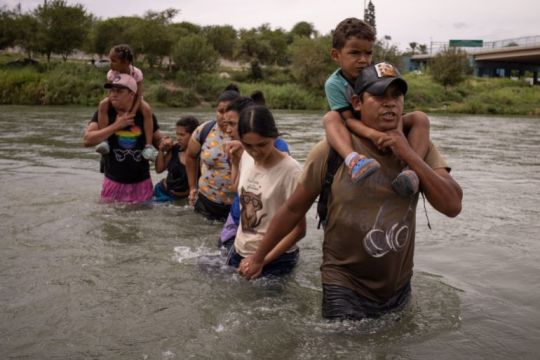
Risks to selling candy
Back home in Ecuador, María said selling candy was primarily women’s work. But in New York, she competes with men and even children on the subway platforms, hawking candy she bought at a wholesale store.
The presence of young children has sparked particular concern among the public. Some subway riders have taken to social media to vent their frustration.
“This is child exploitation and should be banned,” one user on TikTok said. Another called on law enforcement to intervene.
Under New York state law, child labour under age 14 is largely prohibited and can be regarded as abuse. But Alvarez, the anthropologist, said many new arrivals from Ecuador are unaware of the local laws.
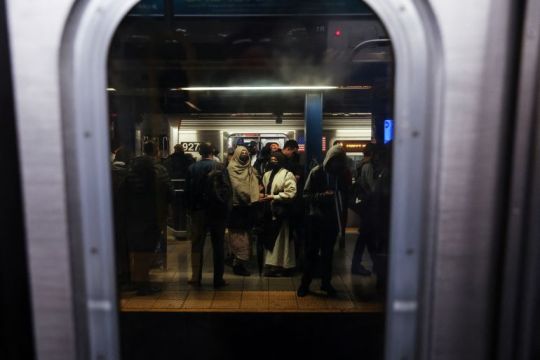
Additionally, the Metropolitan Transportation Authority (MTA) prohibits unauthorised commercial activity in the subway. Police can fine the candy sellers $50 if they catch them, so María is constantly on the lookout for their uniforms.
“We run away from the police when we see them. A ticket can cost what we earn in a day. Police also tell us that we can lose the custody of our children,” she said.
Gustavo Espinoza, a community organiser, explained to Al Jazeera that there are services and organisations working to educate new immigrants about the resources available to them.
However, those without legal immigration papers are often reluctant to seek assistance due to their fear of deportation, Espinoza said. They “live in constant fear”.
“There is evidently a barrier,” he explained. “There are organisations that want to help but they don’t reach the immigrants who need assistance but are afraid to ask or seek help.”
In August, New York City Mayor Eric Adams estimated the city could end up paying up to $12bn to support migrants over the next three years.

But advocates say those efforts are not enough to help migrants and asylum seekers like María, who rarely goes anywhere without her child.
Some are pushing for the New York State Senate to pass a 2023 bill that would offer universal childcare to all parents, regardless of immigration status. But that legislation is still pending.
For María and others, though, there seems to be no alternative but to carry on with their daily routines, children in tow.
María’s daughter rides on her back throughout the day: She only ever sets the two-year-old down briefly, keeping a watchful eye on the child. On top of her cargo of candy to sell, María carries around cookies and a bottle of milk to feed her child, who often dozes as her mother works.
“I can’t leave my daughter alone at home. Nobody will care for her,” María said.
Life, at least for the time being, means balancing both childcare and selling candy in the subway: “There’s no other option.”
4 notes
·
View notes
Text
One year into Joe Biden’s presidency, I wrote a commentary explaining why the administration should pivot to a pro-growth strategy on immigration reform. Meanwhile, Biden has been caught up in the wrangling over the southern border without making the case for increased legal immigration.
The consequences are telling: The administration’s stance on immigration ranks second after inflation as a problem in a survey of voters by Schoen Cooperman Research.
The case I presented for boosting legal immigration was that changing demographics is the main reason that the pace of U.S. economic growth has been cut in half in the past two decades from the post-war average of 3.5 percent per year. As baby boomers retired and the U.S. birth rate slowed, the native-born population has stagnated. Meanwhile, the growth of immigrants has moderated to 0.4 percent per year, or roughly half of the trend rate. The combined effect has been a significant slowing of the working-age population (16-64 years). This has occurred as Congress has failed to enact meaningful immigration reform in three decades.
The case today is even more compelling because of labor shortages related to the COVID-19 pandemic. Prior to the pandemic, net international migration slowed steadily from a peak of 1.2 million in 2016 as a result of measures President Trump took to reduce both legal and illegal immigration. Trump then took further steps to restrict immigration during the onset of the pandemic, including curbing travel to the U.S. and suspending many foreign worker visas and green cards. The administration also invoked the Title 42 public health law to deny asylum on pandemic-related grounds.
Upon assuming office in January 2021, President Biden overturned many of Trump’s immigration policies. As a result, there was a dramatic reversal in the pattern of immigration last year. The U.S. Census Bureau estimates that net immigration to the U.S. fully rebounded from its COVID-19 slump, when immigration fell to the lowest levels in decades. The biggest increases were for work visas and humanitarian migrants.
The timing of the immigration upturn proved fortuitous: It helped to alleviate some of the impact of labor shortages while the overall unemployment rate has been hovering near a 50-year low. Foreign-born workers have a higher labor force participation rate than U.S.-born workers, and they have helped to counter some of the inflationary impact of a tight U.S. labor market.
With the headline Consumer Price Index inflation rate falling to about 3 percent recently, wages are now growing faster than inflation. Net immigration will have to stay at relatively high levels to have a lasting impact in containing inflation, but this is far from assured. Consequently, the case for permitting more legal immigration now encompasses both economic growth and inflation reduction considerations.
Why then is the Republican Party clinging to an anti-immigrant stance when it favors policies that contribute to strong economic growth and low inflation?
One explanation is that Republican concerns about immigration are mainly cultural and political rather than economic. For example, a poll taken by the Associated Press-NORC Center for Public Affairs Research ahead of the 2022 midterm elections found that Republicans are more likely to feel that immigrants threaten to erode America’s culture by a margin of 36 percent to 27 percent. One in three respondents, moreover, feared that immigrants could influence the outcome of U.S. elections.
However, this rendering does not tell the full story of the way the American public feels about immigration.
The conservative-leaning Cato Institute’s 2021 Immigration and Identity National Survey suggests American attitudes about immigration are changing. Nearly three-fourths of those surveyed (72 percent) believe immigrants come to the U.S. to “find jobs and improve their lives,” while 27 percent think they come to obtain government services and welfare. When asked whether immigration should be kept at its present level, increased or decreased, the latest survey showed that the results were fairly similar across the three categories.
Even more telling are recent developments in two key red states — Florida and Iowa.
According to The New Republic, Republican lawmakers in Florida are now backtracking from a bill that was passed to criminalize the transport of undocumented people into the state. The legislation required hospitals to ask about immigration status on invalidated out-of-state driver’s licenses or other ID forms for undocumented people. It also prevented local governments from issuing them. This provoked a strong backlash from thousands of immigrants in the state, so some Florida Republican lawmakers are now trying to do damage control.
Immigration is also likely to be an important issue in the upcoming Iowa caucuses to nominate a Republican presidential candidate. According to a Bloomberg Businessweek report, a glaring shortage of workers has put some of Iowa’s Republican officials on a political tightrope. They are trying to balance the need for increased immigration to ease a hiring crunch in the state, while not straying too far from the national party line on immigration control. Meanwhile, several local business people in Iowa have opposed a bill sponsored by a state senator that would mandate the use of E-Verify to check documents provided by new hires to prove they are authorized to work in the U.S.
5 notes
·
View notes